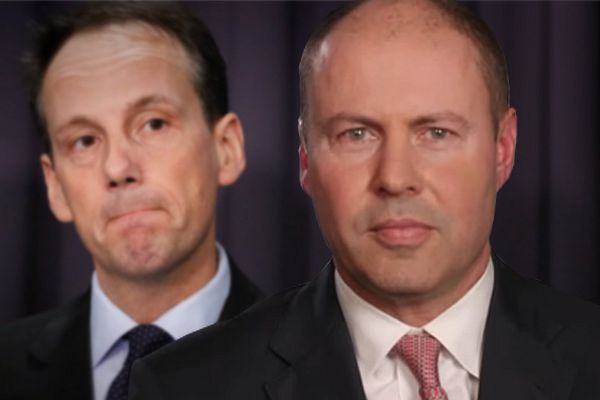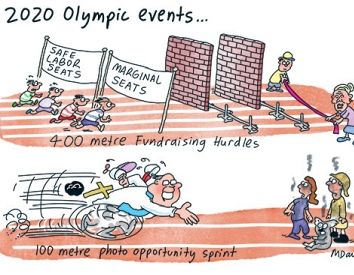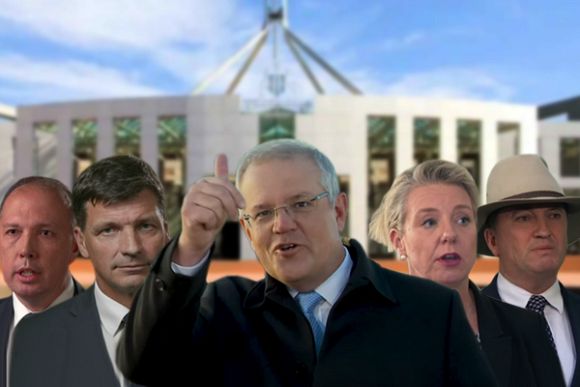The Federal Government secretly deleted from the “independent review” into the corporate regulator three-quarters of the findings into $118,557 the regulator’s boss James Shipton charged taxpayers for his personal “tax advice”.
The Klaxon exclusively revealed that Josh Frydenberg’s Treasury removed from the Australian Securities and Investments Commission review three of the four findings it made in response to official, top-level, concerns raised by the Auditor-General.
The only response not deleted relates to a matter where no specific wrongdoing was identified by the report’s author, former senior public servant Dr Vivienne Thom.
Thom’s responses regarding the other three concerns have been erased entirely.
The matter is extremely serious because Auditor-General Grant Hehir officially lodged his concerns with Treasurer Frydenberg under last resort, anti-corruption provisions provided under federal legislation.
Thom’s deleted findings concerned the fact that consultancy KPMG was given an effective blank cheque to provide the Shipton tax services “without costings or limits”; that KPMG was given the green light almost a year before proper approvals were obtained; and that there is no documentary evidence that ASIC confirmed that the Shipton services actually occurred before it handed over the $118,557 to KPMG.
The Federal Government paid private Canberra-based company CPM Reviews $110,000 to conduct the ASIC review, which was undertaken by Thom.
Before joining CPM in a senior role, Thom, from 2010 to 2015, was Australia’s Inspector-General of Intelligence and Security, where she was responsible for overseeing the nation’s spy agencies.
Thom handed her “final review” to Treasury on 17 December.
Frydenberg has never released the review.
Instead, Treasury prepared its own “abridged” version of Thom’s review, which it completed on 28 January.
On 29 January, Frydenberg released that doctored version, which was ‘prepared by the Treasury’.
Despite providing no evidence to back the claim, Frydenberg simultaneously announced that Shipton had engaged in no wrongdoing.
‘Dr Thom made no adverse findings against Mr Shipton,’ Frydenberg announced on 29 January.
‘I am satisfied that there have been no instances of misconduct by Mr Shipton,’ he wrote.
As previously revealed by The Klaxon, after Frydenberg released the doctored version of her report on 29 January, Thom immediately resigned from CPM.
Thom had been working for the company in senior positions for over four years.
Thom and CPM have repeatedly declined to comment when asked by The Klaxon about Thom’s sudden departure.
The 41-page paper ‘prepared by the Treasury’, which Frydenberg released on 29 January and which is titled Abridged ASIC Governance Report, is a highly unusual document.
Its cover states it was prepared ‘for public release so as not to disclose personal or commercial information or legal advice’.
In normal circumstances, such as following Freedom of Information requests, “sensitive” information that the Government doesn’t want to disclose – such as personal addresses or other personal contact details – is visibly blacked out.
That is, the reader can clearly see where information has been redacted.
Yet in Frydenberg’s 29 January document, nothing has been visibly blacked out at all.
Instead, the report has been completely rewritten, with key components simply erased.
On a casual reading of the document, it is not immediately apparent key information is missing.
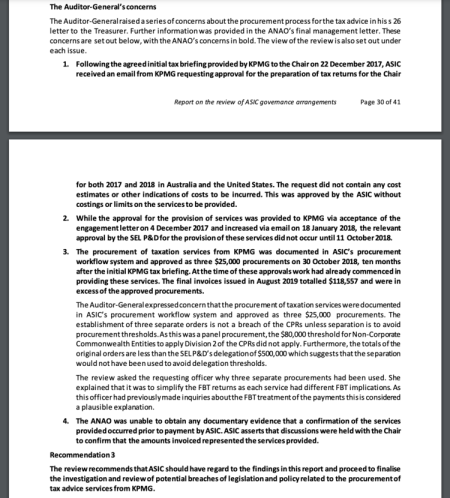
Pages 30 and 31 of Frydenberg’s doctored version of the Thom report (Source: Treasury/Supplied: The Klaxon)
A close examination reveals otherwise.
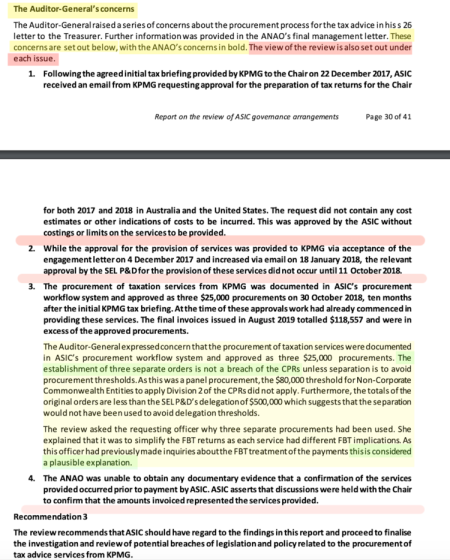
Hehir
The Auditor-General is the nation’s top auditor.
He oversees the Australian National Audit Office (ANAO), which is responsible for auditing the accounts of major public agencies, including those of corporate watchdog ASIC.
The ANAO and Hehir have been raising serious concerns over the $118,557 Shipton payments – along with almost $70,000 ASIC illegally paid towards the rent of then deputy chairman Daniel Crennan QC – since August 2019.
Despite this, ASIC and Treasury took no action.
Calling on a last resort, in a move that ensured the public would be informed of the alleged top-level corruption, Hehir issued Treasurer Frydenberg with a so-called “Section 26” letter.
Legal experts say it is extremely rare that a section 26 letter be issued and that this appears to be the first time.
(The Auditor-General Act 1997 states, under Paragraph 26(1)(a), that if the Auditor-General discovers matters of such importance that they consider the matters should be ‘brought to the attention of the responsible Minister’, then they must do so.)
On 22 October – the morning after the Prime Minister “threw under the bus” Australia Post CEO Christine Holgate – Frydenberg announced the ASIC matters and that he had engaged Thom to conduct what he termed an “independent review” into the matters.
Holgate, legally and within corporate guidelines, gave a total of $20,000 worth of Cartier watches as bonuses to four senior Australia Post executives.
The watches were worth an average of $5,000 each, which was just 1/30th of the maximum $150,000 in bonuses she was legally entitled to allocate to each executive.
By contrast, ASIC chairman Shipton and his deputy Crennan received – themselves, personally – almost $200,000 in illegal benefits.
That’s the equivalent of about 40 Cartier watches.
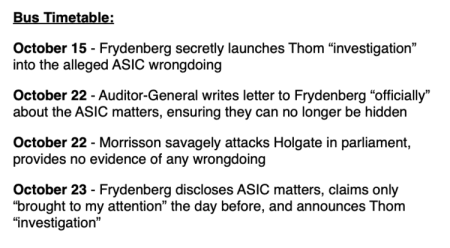
(How Christine Holgate was “thrown under the bus” by the Coalition. Source: The Klaxon)
“Review”
Close examination of the 41-page document Frydenberg released on 29 January, reveals that pages 30 and 31 are where much of the cover-up has occurred.
Under the heading ‘The Auditor-General’s concerns’, Hehir’s four key concerns regarding the Shipton payments are listed.
The document also says that Thom’s responses – the ‘view of the review’ – are included under each of those concerns.
‘The Auditor-General raised a series of concerns about the procurement process for the tax advice in his s 26 letter to the Treasurer,’ the document states.
These concerns are set out below, with the ANAO’s concerns in bold.
‘The view of the review is also set out under each issue,’ it states.
However, the ‘view of the review’ is not set out under each issue.
In the document Frydenberg released on 29 January, nothing at all appears under three of Hehir’s four serious concerns about the Shipton payments.
The only one of Thom’s findings – the ‘view of the review’ – left in the document is concern number three.
This relates to ASIC having recorded the $118,557 Shipton “tax advice” payments in its “workflow system” as three payments of $25,000.
In this case, Thom said the evidence suggested the action was not undertaken ‘to avoid delegation thresholds’.
This because the normal threshold of $80,000 did not apply because the Shipton payments were classified as a “panel procurement”.
Thom said the “requesting officer” at ASIC who split the amounts said they had done so to simplify them for fringe-benefits tax reporting, which Thom said was a ‘plausible explanation’.
The three deleted findings concern ASIC setting no limits on the Shipton tax advice.
The Auditor-General and his ANAO raised concerns that KPMG provided Shipton with an ‘agreed tax briefing’ on 22 December 2017, but then KPMG subsequently sought from ASIC ‘approval for the preparation of tax returns’ for Shipton ‘for both 2017 and 2018 in Australia and in the United States’.
They wrote:
‘The request did not contain any cost estimates or other indications of costs to be incurred. This was approved by the ASIC without costings or limits on the services to be provided.’
The second deleted Thom finding relates to KPMG having been given the go-ahead to provide the Shipton services almost a year before they were properly approved.
The Auditor-General and ANAO warned:
‘While the approval for the provision of services was provided to KPMG via acceptance of the engagement letter on 4 December 2017 and increased via email on 18 January 2018, the relevant approval by the SEL P&D (senior executive leader of People and Development) for the provision of these services did not occur until 11 October 2018.’
The third relates to the ANAO being ‘unable to obtain any documentary evidence that a confirmation of the services provided occurred prior to payment by ASIC’.
The ANAO said:
‘ASIC asserts that discussions were held with the Chair to confirm that the amounts invoiced represented the services provided.’
As revealed by The Klaxon on 18 January, private consultancy KPMG had actually been running “internal audits” at ASIC, the Government corporations regulator.
Treasurer Josh Frydenberg has repeatedly declined to comment when contacted by The Klaxon regarding his claims that Shipton engaged in no wrongdoing.
Shipton remains chair of ASIC – over six months after Hehir lodged the section 26 letter – earning a taxpayer-funded salary of over $800,000 a year.
Frydenberg has said Shipton will be replaced, though he has not explained why given Frydenberg also claims Shipton engaged in no wrongdoing.
Shipton was appointed to head ASIC by then Financial Services Minister Kelly O’Dwyer under then Treasurer Scott Morrison.
Following Frydenberg’s unsubstantiated 29 January claims that Shipton had engaged in no wrongdoing, almost every major Australian media outlet incorrectly reported the Thom review had “cleared” Shipton of wrongdoing.
The review made no such findings.
(As The Klaxon previously revealed in extensive detail here, here, here, here and here).
None of those media outlets have yet corrected the errors, which fundamentally misrepresent the biggest scandal to rock ASIC in its 30-year history.
Even the 41-page “redacted” version of Thom’s review provides clear evidence that the Shipton payments were against the law.
It contains official statements from the ANAO – which is both the entity responsible for auditing ASIC and Australia’s most senior auditing authority – saying that less than $2,000 of the payments were legal.
The $118,557 that Shipton’s ASIC paid for Shipton to receive personal “tax advice” was over 60 times the legal limit.
As revealed by The Klaxon last week, veteran public servant Karen Chester has refused to stand by Frydenberg’s claims that Shipton has engaged in no wrongdoing.
Anthony Klan is an investigative journalist. You can follow him on Twitter @Anthony_Klan. This article was originally published at The Klaxon and has been republished with permission.
Related Articles
- Mainstream media quick to ignore Kristina Keneally's corruption accusations
- Australia no longer in top ten global anti-corruption ranking
- Government's proposed anti-corruption body 'a post-modern joke'
- The Commonwealth Integrity Commission comes with limitations
- Proposed Commonwealth Integrity Commission would be an LNP weapon
Support independent journalism Subscribe to IA.



